The
Central - Highlands has many famous tourist points for both local and foreign
people such as Phan Thiet, Mui Ne, Nha Trang, Da Lat, Phu Yen, Hoi An, Da
Nang, Hue, Phong Nha - Ke Bang, Son Doong cave… Therefore, the region is a
potential area to promote and develop its tourism services and cuisine.
With
its geographical location stretches from South to North, including mountains,
midlands, plains and seas, each place has its own specialty and a deep culture
and flavor. The specialty was expressed at the preliminary round of "The
Golden Spoon Award" contest this year.
The
Central is known as “land of sun, rain, thunderstorm, and storm” which is
supplemented with abundant aquatic species from Mother Nature; and the
Highlands is home of various potential new spices to be explored. With the
theme "Home tastes in integration
time" of the preliminary round, Chef in this contest are required to introduce
local specialties, new culinary styles and spices. All contestants performed
and devoted for a fascinating and dramatic event.
Highlands cuisine:
basic and simple but distinctive
From
the preliminary round of The Golden Spoon Award in this region, teams from
Highlands have good impressions for judges and food lovers. The Chef have
brought to the contest spices from their ethnic community such as ant eggs, hill-fed
chickens, village-fed chickens - a half-blood chicken specie with wild chicken,
Doi nut (Michelia mediocris Danny), malva
nut, Vong leaf (Erythrina
variegataL.), wild Sam leaf (Tiliacora
triandra), brindle berry, wild betel leaf, magenta leaf, paddy oats (Gnetum gnemonL.), May stem, coffee maker (Solanum hainanense Hance), wild areca, wild
bamboo, Dak Lak avocado and pepper, Da Lat vegetable, Bien Ho shrimp, hemibagrus
in Serepok river, loach in Se San river...
Besides
the traditional specialties of Highlands cuisine, there was also new style food
at the contest such as bamboo-tube rice (cơm
lam) with its special smell made by E-de and Bana people; traditional Poi
rice of Chut people which is a combination of corns, sticky rice and jicama; muoi
e (É salt) - an excellent dipping
made by mixed É leaves and salt. This sauce initially appeared in Phu Yen
province only and it has been made by people in Highlands provinces later.
Anh Vu carp and Tonlé Sap shrimp were introduced by Pleiku Palace Restaurant Team in the competition.
The
rough and simple food display of the teams who came from "the roof of
Indochina" seems to have given way for the first and new flavors appeared
at The Golden Spoon Award. The breakthrough in cooking and combination of the wild vegetables, leaves, flowers, and
fruits has created surprises for professional judges and media. The spices create
not only new trends but also make the taste of local cuisine more tasty,
delicious and nutritious.
Among
the teams from this epic land, team Shop 79 Gia Bao (from Kon Tum province) leaded
by Nguyen Duc Hoang convinced judges by its simple but distinctive savor to win
the first prize of Highlands region. Among the variety of wild vegetable,
leaves, flowers, and fruits that Team 45 used for their dishes, seed of wild
sumac, first time being used at The Golden Spoon Award, has received attentions
from experts.
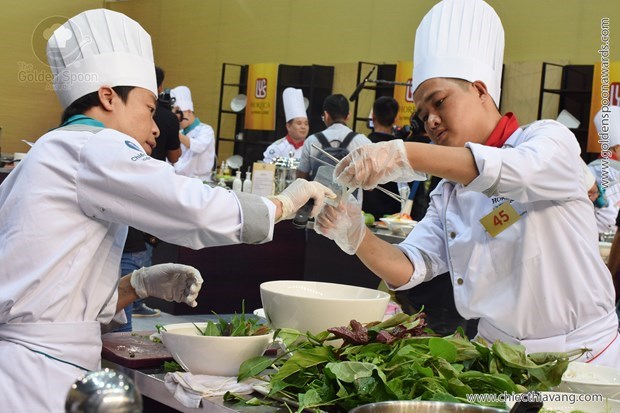
Chef
Hoang said: "Gia-rai and Bana people
usually crush sumac's seed, or also called as fruit of sumac, to make dipping served
with buffalo meat at important events. When it's fresh, the seed is salty and
has white color. After being dried, seed shrivel, color turns into dark brown
and it has slightly sour and salty tastes. The color of sumac seed depends on
humidity. During the blooming time, if it's foggy, flower and seed will have
white color. If it has less fog, flower and seed will have brown-red color.
This plant has its flowers in December and its fruits by Tet holiday.
Therefore, I have collected the seed at Chu Mom Ray Nature Reserve (Kon Tum)
and saved it from last year”.
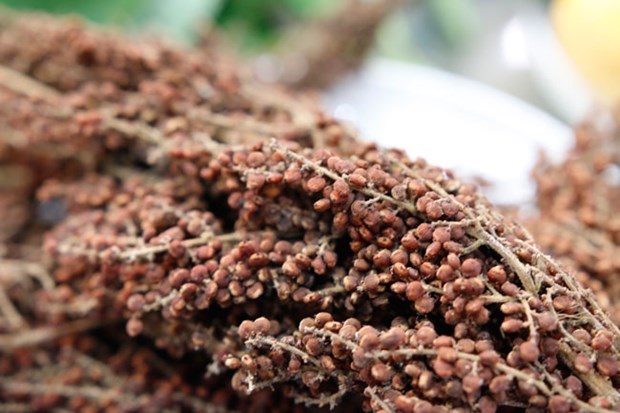
Hạt muối rừng (Rhus chinensis)
Curiosity
in this new condiment, the Chef had more studying from various sources and
discovered: sumac is also called by other names such as Son Muoi, Da Son, Diem
Phu Moc, Ngu Boi Tu Thu (scientific name:
Rhus chinensis, angiosperms). Sapling, height is from 2m to 8m. Alternate
foliage with 7 to 14 leaflets. The light brown petiole has short hairs around. Oviform leaflet has no petiole, large saw shape at edges, length 5 to 14cm, width
2,5 to 9cm. Flower clusters have clavate shape bloom at top, length 20cm to
30cm. It has small white flowers with sweet fragrance. Nut has orange-yellowish
color, 1-seed nut. The plant grows in forest in northern mountains and Gia Lai,
Lam Dong provinces.
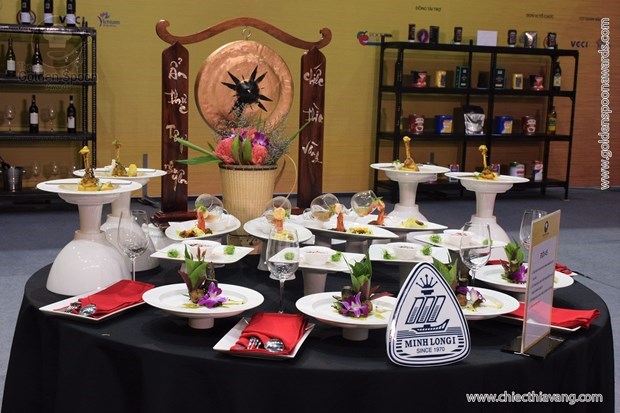
In
Oriental medicine, the roots and leaves of sumac has its salty and cool essence
which is good for blood detoxification and blood canopy. The root's bark is
also salty, tart, cool which can help for canopy retention, inflammation
detoxification, diuretic, rheumatism relief. Fruit is helpful for hemostasis
and, blood detoxification.
Chef
Hoang used wild sumac to make tasty sauce for loach fish rolled in wild betel
leaf and other 5 vegetable. Loach fish from legend Se San river has tasty meat
which can be replaced for traditional buffalo meat of Highlands people.
Meanwhile the five vegetable including sesame leaf, tiger's claw leaf, wild
river-leaf creeper, wild otaheite apple leaf, wild Sam leaf create a unique
harmony of mountain savor. Professional judge, Bui Thi Suong, commented: "Sumac seed is a new discovery in this
year contest. The sauce made from sumac is mixed with loach create perfect
taste. The 5 vegetable also helped to evoke the savor of dishes. I've tried wild
vegetable salad before and I have a chance to taste it again today is a very interesting
experience for me".
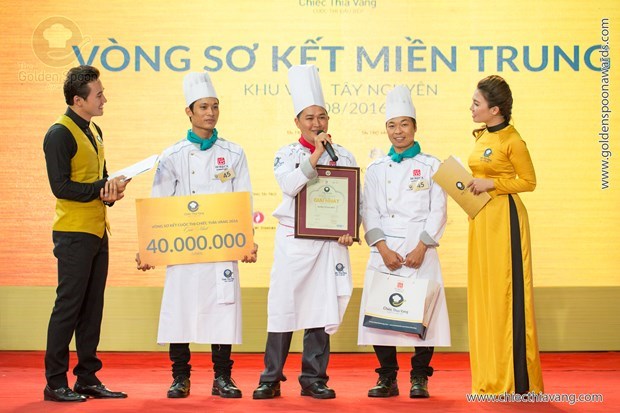
Team Shop 79 Gia Bao (from Kon Tum province) leaded by Nguyen Duc Hoang won the first prize of Highlands region.
South Central Cuisine:
the richness from the sea
On
the contrary of Higlands teams, on the preliminary test day of the South
Central teams, Chef from Khanh Hoa, Phu Yen, Binh Dinh, Quang Ngai provinces brought
to the contest the richness from the sea. With many raw materials such as crab,
shrimp, jellyfish, grouper, golden rabbit fish, seabass, tuna, seaurchin, sharks, mussel, seaweed, scallops,...
the contest of the Chef, who are from local and international famous high-class
restaurants, hotels and resorts, was not just a seafood cooking show but also a
place to show their professional cooking techniques.
If
the teams from Khanh Hoa province showed many kinds of fresh seafood which was brought
from 500km long , the teams from Phu Yen
and Binh Dinh provinces brought in traditional flavors such as Nau chives, Son
Thanh green pepper, Tuy Hoa malva nut, Bau Da wine…
In
general, teams from "Nẫu" area – a noun used to call people other -
introduced their local particular culinary, upgrades in cooking and ingredients
combination skills follows the contest theme: "Home tastes in integration time". However, the
similarity in culinary culture among the teams somehow did not create the
unique for the team in particular.
Meanwhile,
with less experiences at The Golden Spoon Award compared with other teams, the new
coming contestant from Cam Thanh Hotel (the only representative from Quang Ngai
- Team 45) convinced judges with their particular menu of An mountain's and Tra
river's area. Ly Son seaweed delight salad - Don in Tra river, Nien fish (Onychostoma
gerlachi) with wild pepper, silkie steam with sea cucumber and bread, Sam
jelly - Ly Son spinach jelly.
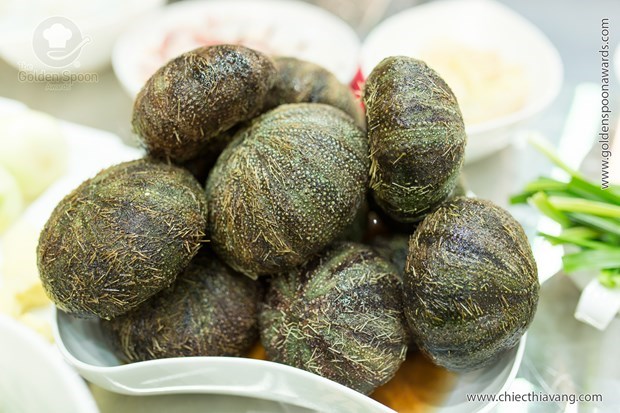
Seaurchin.
With
daily local ingredients such as Don – a member of clams in the mollusc order
Veneroida - in Son Tra river, Nien fish, Ba To wild pepper, sea cucumber, Ly
Son spinach and seaweed, team leader Nguyen Minh Hien has showed to judges and
diners a picture of Quang Ngai province with its people who always want to
introduce their local cuisine to people. Chef Hien said: "This is the first time we join The Golden Spoon. My first purpose
is to study and exchange cooking experiences from friends and other teams, especially
teams from famous tourist cities; I also want to introduce to all people about
culinary of Ly Son Island where is also a new famous tourist destination with
many potential development conditions in the future".
To
realize the passion, the team from Sa Huynh cultural land brought to the contest
their specialties such as Don fish in Son Tra river, Nien fish, Ba To wild
pepper, sea cucumber, Ly Son spinach and seaweed... With professional
techniques and serious preparation, Chef Nguyen Minh Hien and his team made 'home dishes' new dedicated and
harmonious dishes in colors and senses.
Culinary
artisans Bui Thi Suong commented about dishes of this team 63: “The team has a serious preparation both in
ingredients and condiments. I'm impressed by your combination of condiments.
You prepared and taken out fish bone professionally. Well slices on fish make
fish meat look good with no crushes, keeps its toughness and smell. Regarding
the savor, you have good mixture of condiments, especially the scent of wild
pepper. One more thing I like about your team is the way you send the message
and introduction your hometown with your very local ingredients”.
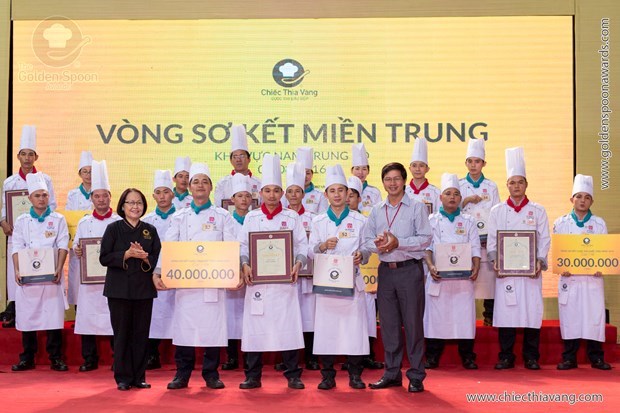
Anh Vu carp and Tonlé Sap shrimp were introduced by Pleiku Palace Restaurant Team in the competition.
North Central: delicate
and modern
The
preliminary round contest of North Central had 19 teams: 8 teams from Hue, 6
teams from Da Nang, 3 teams from Quang Nam, and 2 teams from Phong Nha - Ke
Bang, the world natural heritage, and Son Doong cave (Quang Binh).
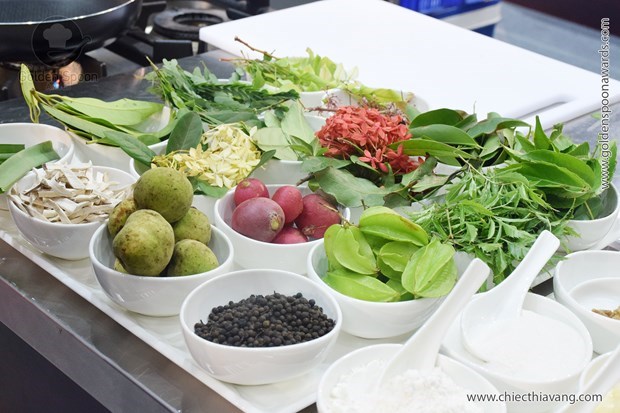
When
it comes to the cuisine of this region, the cuisine of Hue is considered the
cradle of Central culinary. Hue people is famous for not only their elegance but
also their stylish dining culture from choosing ingredients to the processing, displaying
precious dishes. With Hue's Chef skills, every dish becomes an admirable
artwork. Chef at the 4th The Golden Spoons Award this year are not exceptions.
With
8 out of 19 teams, Chef from “Huong river and Ngu mountain” did not bring to
the contest their familiar dishes such as Bird's nest, fermented peacock roll, fermented
phoenix sausage, rhino's skin, bear's hand, deer's tendon…which are dishes in “top
8 precious dishes” of ancient culinary arts, or daily well-known dishes like
Gia Hoi's noodle, Dong Ba's Khoái cake, Ngu Binh's Bánh bèo, Nam Pho's noodle
soup, or Kim Long's drilled meat with rice pancake... but the team's all dishes
at The Golden Spoon Award have their own Hue specialties.
Using
lotus for processing and dishes display is common interest of the teams. Lotus
is symbol of romantic Hue, all leaves, roots, flowers, seeds, stigmasare
used to make specific savor for their dishes. The lotus petals are not only for
cooking but also for decorating to create the harmony of color and savor,
nature and culinary arts.
With
available local ingredients such as A Luoi wild bamboo, eel in Nhi Ho fall,
Dien Dai potato, Tam Giang seafood, Thuy Bieu strawberry and grapefruit, Minh
Mang wine, Aloes Vera, purple yam, areca flower,... Chef from Hue showed a good
harmony combination of the simplicity of cultural culinary with precious
culinary from ancient imperial. Those dishes are not only have all ying and yan
balance and the Asian principle of five elements of traditional culinary but
also brought more new interest to the contest.
Hue
culinary is also famous for its Che (sweet soup). Hue is considered as Che
kingdom. Che is therefore available in dessert menu such as aloe vera-fruit sweet soup, corn sweet soup,
durian-taro sweet soup, lotus seed-aloe vera sweet soup, pumkin-lotus seed
sweet soup... It seems that the sweetness and dedication in Che is one of
the perfect representation for Hue cuisine and its people.
Different
from the tradition of Hue cuisine, Chef from Quang - Da (short form of Quang
Nam - Da Nang provinces) brought in new and modern culinary. They have highest
number of teams (9 out of 19 teams) in this contest. This region is where the preliminary
round of the 4th Golden Spoon contest took place for Central-Highlands regions.
Thanks to this, the teams have a well preparation on their homeland for their
dishes.
Besides
the local specialties such as Cau Mong
calf, Tra Que vegetable, Hong Dao wine, A Mot pepper, Que Son sweet potato and Jícama
noodle soupe, Nam O shark, Deo Le chicken, Tay Giang wild pepper, Cham island
taro, Hon Tau mountain leaf and vegetable, Duy Nghia purple sweet potato, “sâm
cát” vegetable (Launaea sarmentosa)…,
Chef from Quang Nam and Da Nang provinces also sent an image of their young and
dynamic lifestyle and of young people who always look for new trends and the
passion to win the first prize of this culinary challenging contest.
Among
the prominent participants from famous restaurants, hotels, resorts presented
at this year's preliminary round, team InterContinentral - Danang Sun Peninsula
Resort - led by Chef Nguyen Huu Hau was impressed by the use of modern
processing techniques to create delicious and nutritious dishes. Culinary
artisans Bui Thi Suong commented: "I'm
very impressed with your modern cooking techniques. You show yourselves as trendy
Chef and know how to update new culinary trends. Up to now, the slow cooking technique
and molecular gastronomy trend are the most unexpected highlights at the contest."
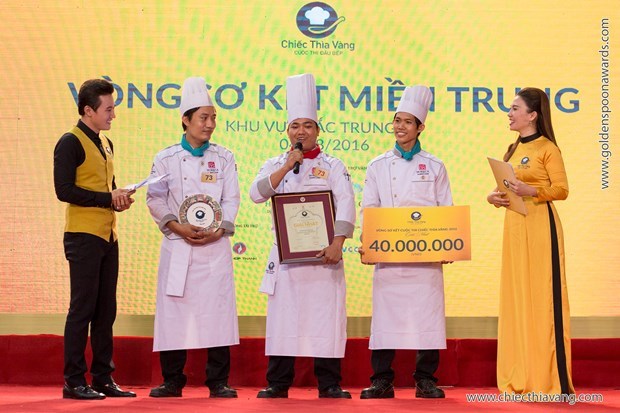
Team InterContinentral - Danang Sun Peninsula Resort - led by Chef Nguyen Huu Hau won the first prize of North Central region.
Besides
new cooking techniques, with well-prepared menus and modern displaying
including glass salad, pigeon-pear spring
roll; cod fish soup with shrimp sauce and wild vegetable savor, slow-cooked tenderloin
steak with wild pepper sauce, summer young vegetable and Sambal ginger, traditional
wild pepper chocolate ball with raspberry savor, and black seasame muffin, Chef
Nguyen Huu Hau convinced judges and won the first place of North Central regions.
In
addition, the judges also awarded to 08 second prizes (each worth 30 million VND)
for Naman Retreat Hotel (Da Nang), Pullman Danang Beach Resort, Indochine
Palace Hotel (Hue), Grand Sunrise Hotel (Da Nang), Crowne Plaza Danang Hotel,
Baoninh Beach Resort, Palm Garden Beach Resort & Spa Hoi An, and Hue
Century Hotel.
After
three days of competition, the preliminary round of the Central - Highlands
have a total of 19 teams who will take part in The Golden Spoon semi-finals in
2016.
By The Golden Spoon Award